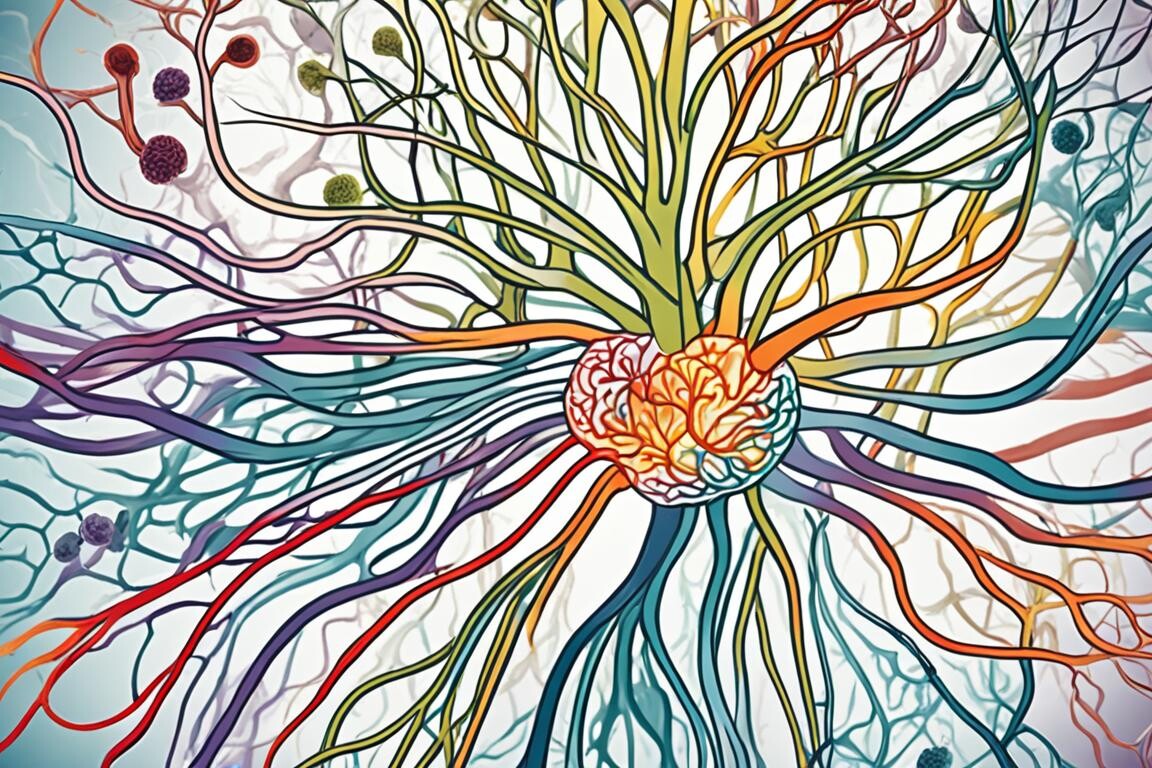Multiple sclerosis (MS) is a complex disorder that affects the nervous system. It can change your health and how you live. This issue happens when your body’s defense system attacks the myelin sheath. This sheath is the covering of the nerve cells in the brain, optic nerve, and spinal cord. When the myelin sheath gets damaged, it slows down or stops the nerve signals. This leads to a range of symptoms.
MS has different types. One common type is called relapsing-remitting multiple sclerosis. This kind has sudden attacks or relapses, then quiet times or remissions. During an attack, you might have vision issues or feel numb. You could also notice tingling, have trouble keeping your balance, or your muscles might get stiff. These symptoms usually start quickly over a day or two. They can last from a few days to a few weeks. After that, they get better by a lot, often 80 to 100 percent.
We are still learning about what exactly causes multiple sclerosis. But we do know that certain things make it more likely for you to get it. These might include your age, gender, if you lack enough vitamin D, are obese, smoke, have a family history of MS, and even where you live. Some infections and autoimmune diseases could also play a part.
Table of Contents
ToggleWhat is Multiple Sclerosis?
Multiple sclerosis (MS) is a disorder that affects the immune system. It targets the myelin sheath, found covering nerve cells in the brain, optic nerve, and spinal cord. This sheath, like the insulation on a wire, protects the nerve fiber. Damage to it slows or blocks signal transmission.
Myelin Sheath and Nerve Damage
In MS, the body’s immune system can also damage the nerves themselves. It can fix some myelin sheath damage, but not all, leaving behind lesions. As people get older, they lose some brain and spinal cord cells naturally. However, individuals with MS lose these cells faster in the damaged areas.
Scars and Brain Cell Loss
Over time, this can lead to a gradual worsening of symptoms. These may include issues with walking that grow over years. The common type of MS is relapsing-remitting MS. It shows as attacks followed by recovery periods.
Relapsing-Remitting Multiple Sclerosis
During a relapse, symptoms can get worse quickly and then gradually improve. It’s important to understand the mechanisms of MS. This includes the damage to the myelin sheath and nerves. It also involves the loss of brain and spinal cord cells. Such knowledge is key to managing this neurological condition effectively.

Risk Factors for Multiple Sclerosis
The cause of multiple sclerosis is still a mystery. But we do know some things that can make it more likely. Knowing these risk factors is helpful for anyone worried about getting this disease.
Age and Gender
MS doesn’t pick a specific age, but it’s often seen in those from 20 to 40. Women are more likely than men to get the most common form, relapsing-remitting MS.
Vitamin D and Sunlight Exposure
Not enough vitamin D and sunlight time can raise the risk for MS. Making sure you get plenty of both might lessen your chances of having MS.
Obesity and Smoking
Being overweight increases the chances of MS. Smoking makes MS symptoms, like relapses and cognitive issues, much worse.
Family History and Genetics
Your family history and genes have some say in your MS risk. If someone in your family has had MS, your risk goes up. Certain genes might make you more likely to get MS.
Infections and Autoimmune Diseases
Infections, like the one that causes mono, could up your MS chances. Autoimmune diseases also slightly increase the risk of getting MS.
Geographic Location and Ethnicity
Where you live and your ethnic background matter for MS risk. Cooler regions and certain places in the world have more MS cases. White people of northern European descent are at the highest risk.

Multiple sclerosis symptoms
The signs of multiple sclerosis can be different for everyone. But, some common symptoms include:
Vision Problems and Optic Neuritis
For about one in four people with MS, eye problems are their first sign. This is called optic neuritis. It might make you lose vision or see colors differently. It can also cause eye pain, see flashes of light, or have trouble with double vision.
Numbness and Tingling Sensations
Feeling numb or tingly can be an early MS symptom. These feelings might start in one spot and spread over a few days. They happen because something harms the protective covering of the nerve fibers.
Loss of Balance and Dizziness
MS can make moving hard. You might find it tough to walk or stay balanced. You could also have shaking or feel dizzy. Lesions in the brain and spinal cord are often behind these issues.
Muscle Stiffness and Spasms
Pain in your back, neck, and joints is widespread in MS. These pains come from having trouble moving well due to the disease.
Tremors and Shakiness
Shaking and tremors can also be because of MS. They happen when the nerves for movement are damaged.

Other Common Multiple Sclerosis Symptoms
Along with early signs like trouble seeing, feeling numb, and losing balance, those with MS may have other common issues. These can really change how they live daily. Knowing about these helps deal with multiple sclerosis better.
Fatigue and Overwhelming Tiredness
Fatigue is a big hurdle for many with MS. It makes everything hard, even simple tasks. People often say they feel low on energy, even after sleeping well.
Pain and Unpleasant Sensations
Many with MS feel different types of pain, like nerve pain. This can be tough to handle and lower their life quality. They may describe these feelings as burning, tingling, or like electric shocks.
Bladder and Bowel Issues
Bladder troubles like needing to go often, in a hurry, or getting UTIs are seen a lot in MS. Stomach problems such as becoming constipated or not being able to hold it can also affect many. This makes their day-to-day and personal care harder to manage.
Memory and Cognitive Problems
Many with MS find it tough to think clearly or remember things. This can make daily tasks hard and lessen their freedom.
Diagnosing Multiple Sclerosis
Diagnosing multiple sclerosis (MS) is not easy and usually needs more than one test. Doctors use what they see, imaging, and lab tests to figure it out. They look for specific signs when diagnosing MS.
Neurological Examination
A neurologist will do a full check on your nervous system. They test things like your reflexes, muscle strength, and eyesight. This helps them find any issues in your central nervous system.
MRI Scans and Spinal Fluid Analysis
MRI scans are a big help in diagnosing MS. They show if there’s damage to the myelin sheath. A spinal tap can also check for specific markers in your spinal fluid.
Ruling Out Other Conditions
Doctors first need to make sure your symptoms aren’t from something else. They will test for infections, lack of vitamins, and other diseases. This helps them focus on MS as the cause.
Optical Coherence Tomography (OCT)
OCT is a way to check your eyes without being invasive. It can find eye and nerve damage. This can be an early sign of MS.
Putting all these tests together helps doctors confirm a multiple sclerosis diagnosis. Then, they can plan the right treatment to help you.
Managing Multiple Sclerosis Symptoms
To manage MS symptoms, both physical and mental health care are essential. Specialists use corticosteroids and plasmapheresis to reduce nerve inflammation during attacks.
Corticosteroids and Plasmapheresis
Intravenous methylprednisolone works well in MS relapses by cutting down symptom times. Plasmapheresis might also be used to take out harmful antibodies in the blood to reduce inflammation.
Disease-Modifying Therapies
Along with treating symptoms, disease-modifying therapies (DMTs) can slow MS’s progression. These come in injectable, oral, and infusion forms. They lower relapse rates and lessen new lesion development, potentially reducing disability over time. Discussing their risks and benefits with your healthcare team is crucial.
Physical and Occupational Therapy
Therapy is key for MS patients to deal with symptoms and keep independence. It focuses on handling muscle weakness, balance issues, and tiredness. It teaches skills for everyday life and getting around.
Mental Health Support
Living with MS can greatly affect mental well-being. Support from counselors or psychologists is beneficial. They offer help in facing condition challenges, handling stress and depression, and learning good coping methods.
Seeking Support for Multiple Sclerosis
Living with multiple sclerosis (MS) brings many difficulties. However, various resources and support systems can help you cope. It’s crucial to have a strong medical team, stay active and connected, and join community support groups. These steps are key to improving your well-being.
Building a Medical Support Team
Creating a team of MS healthcare experts is vital. Your team might include a primary care doctor, a neurologist, therapists, and mental health professionals. They will develop a treatment plan to address your symptoms and improve your quality of life. You can find these specialists through the National Multiple Sclerosis Society’s “Ask an MS Navigator” page.
Staying Active and Engaged
Being active and exercising can help with MS symptoms like fatigue and muscle stiffness. FitMS offers group classes for advanced MS participants. These classes are free and provide a supportive way to exercise and socialize. Also, picking up hobbies, volunteering, or joining community events can keep you mentally sharp and emotionally balanced.
Connecting with Support Groups
Joining a support group for people with MS can offer valuable information and emotional support. You can find groups through various MS organizations. These groups allow you to share experiences, learn about new treatments, and meet others who understand MS challenges. Online forums and local support meetups can also help you feel connected and supported.
With a solid medical team, an active lifestyle, and connections to support groups, facing MS is less daunting. These support structures and resources can help you live well despite the condition’s challenges.
Ongoing Research and Future Treatments
Scientists keep learning more about multiple sclerosis (MS) every day. They are finding new and better ways to help people. Even though we don’t know MS’s exact cause, we are getting closer.
Thanks to research, we understand how MS works better. This helps us find new ways to manage its symptoms and slow down its effects. This means people with MS can be more hopeful about the future.
New treatments like Glatiramer acetate, Ofatumumab, Teriflunomide, Fingolimod, and others are available. They work on the immune system to lessen relapses. Scientists are also looking into using stem cells and BTK inhibitors for MS treatment.
The more we learn, the more we can help those with MS. New treatments and better knowledge offer hope. People with MS can partner with their doctors to manage symptoms and keep a good quality of life.
Conclusion
Multiple sclerosis is a tricky and hard to predict neurological disorder. It can change your life a lot. But, with more knowledge, better treatments for MS, and support, you can handle its symptoms. This can help you keep a good life quality.
Being active in getting care, taking part in things, and talking to others facing MS can really help you do well. Despite MS’s many unknowns, you can still find ways to grow.
Scientists keep looking into what causes MS and its related risks. They study things like the environment, genes, and our life choices. This effort can lead to better treatments in the future. So, there’s always hope and support for those with MS.
It’s important for people with MS to keep learning and being active in their health. By focusing on what they can change and finding joy in life, they can do well. With the right support and a positive attitude, living with MS is a challenge that can be overcome. This lets people enjoy life fully and meaningfully, no matter their condition.
FAQ
What is multiple sclerosis?
Multiple sclerosis (MS) is a disorder where the immune system attacks nerve cell coverings. This protective layer is called the myelin sheath. It affects the brain, optic nerve, and spinal cord.
It can slow down or stop the nerve signals. This leads to lesions or scars in the affected areas.
What are the common symptoms of multiple sclerosis?
Early signs of MS can vary. However, common symptoms include vision issues, tingling feelings, and issues with balance. You might also experience muscle stiffness, spasms, and tremors.
How is multiple sclerosis diagnosed?
MS doesn’t have a single test for diagnosis. Doctors might perform a neurological exam and use MRI scans. They may also analyze spinal fluid and rule out other conditions.
How is multiple sclerosis treated?
Managing MS involves several approaches. This includes corticosteroids and disease-modifying therapies. Physical, occupational therapy, and mental health support are also essential.
How can I seek support for living with multiple sclerosis?
Living with MS can be hard, but support is available. You can build a medical team, stay active, and join support groups. These steps can help a lot.
Source Links
- https://www.mayoclinic.org/diseases-conditions/multiple-sclerosis/symptoms-causes/syc-20350269
- https://www.nhs.uk/conditions/multiple-sclerosis/symptoms/
- https://www.hopkinsmedicine.org/health/conditions-and-diseases/multiple-sclerosis-ms
- https://www.ncbi.nlm.nih.gov/pmc/articles/PMC8189778/
- https://www.mayoclinic.org/diseases-conditions/multiple-sclerosis/diagnosis-treatment/drc-20350274
- https://www.nhs.uk/conditions/multiple-sclerosis/diagnosis/
- https://www.ninds.nih.gov/health-information/disorders/multiple-sclerosis
- https://www.webmd.com/multiple-sclerosis/ms-help-resources
- https://www.webmd.com/multiple-sclerosis/multiple-sclerosis-resources
- https://www.mayoclinic.org/diseases-conditions/multiple-sclerosis/expert-answers/emerging-treatments-for-ms/faq-20096786
- https://www.ncbi.nlm.nih.gov/pmc/articles/PMC5241505/
About The Author

Medically reviewed by Dr. Chandril Chugh, MD, DM (Neurology)
Board-Certified Neurologist
Dr. Chandril Chugh is a U.S.-trained, board-certified neurologist with expertise in diagnosing and managing neurological disorders, including migraines, epilepsy, Parkinson’s disease, and movement disorders. His clinical focus includes evidence-based neurological care and patient education.
All content is reviewed for medical accuracy and aligned with current neurological guidelines.




